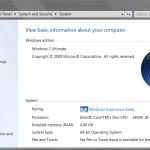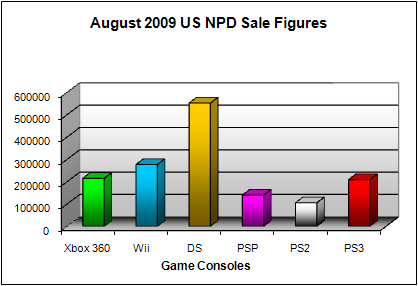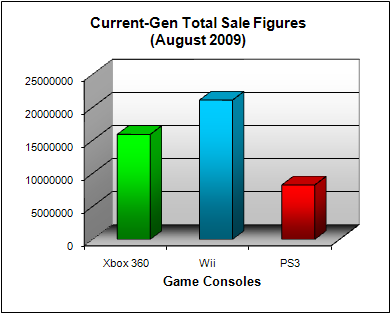With Windows 7 coming in less than a month’s time, it certainly seems like it’s the operating system that Vista should have been, and I think Microsoft are on their way to a very successful launch, despite their horrible marketing campaign. And for those upgrading – and I hope you’re opting for a clean install because that’s the only way to get the best out of Windows 7, performance wise – then this is the perfect opportunity to go to a 64-bit OS if you’re not already using one. The reason is that to go from 32-bit to 64-bit, even within the same OS version, you’ll need a clean install, so you might as well bite the bullet when doing the XP/Vista to 7 upgrade. If you’re already using a 64-bit OS, then please ignore the blog I’ve just written, otherwise it’s well worth a read to find out if 64-bit is for you, or if 32-bit is good enough for now.
Otherwise, it was a fairly quiet week, with a few stories occupying the headlines to still make it a very interesting week, although most of it was yet again about the issue of copyright.

Let’s start with the copyright news. There was only really one news item that really caught the attention of people this week. And not even Sir Elton John could push the news out of the headlines, much of it thanks to the reactions to the story on the Internet.
Earlier in the week, musician Lily Allen decided to take a stand on the issue of online music piracy. But unlike many others who have come out against the proposed three-strike Internet banning policy, Ms Allen has come out for it, even launching a blog called “It’s Not Alright” to voice her views on piracy. Now there is nothing wrong with someone expressing their views, in fact, that’s what the Internet is for. However, if you do come out with some opinion, especially a controversial one, then make sure you are untouchable when it comes to arguing the facts. Unfortunately, Ms Allen made the mistake of not doing enough vetting into her personal history in regards to piracy, and in netspeak, she has been truly and thoroughly pwned. It turns out that, in publishing her anti-piracy views, that she might have pirated the article of high tech news and discussion website, Techdirt. And not only that, a few days later, it was revealed that Ms Allen was a distributor of pirated music herself, with some self-made mixtape MP3s that was available for download from her website, that featured songs that she (and her record company) did not have the distribution rights to. Oops.
Some dude said nearly 2000 years ago that “let he who is without sin, cast the first stone”. And if one is to take the moral stance that anyone who has downloaded or shared an illegal MP3 (and that’s a lot of people) is a thief and should be punished harshly, than he, or she, should at the very least ensure that they have not committed the same “crime”. Because the truth is that it’s very easy to commit this crime, it may be because you think you’re not doing anything wrong by not paying for something you never had the intention to pay for in the first place, or perhaps you think sharing songs is a great way to promote the song and the artist and it may lead to you, or the people you shared the song with, to become a fan and start buying. There are legitimate arguments for and against a heavy crackdown on piracy, but as the Lily Allen incident showed us, it’s far too easy to be labeled a pirate just because, earlier in your music career, your appreciation of other artists led you to make a mixtape that somehow ended up online. And as Ms Allen posted on her blog about the mixtapes, “I made those mixtapes 5 years ago, I didn’t have a knowledge of the workings of the music industry back then”. But Ms Allen, under the very legislation that you support, you would be punished for what you claim you did out of ignorance 5 years ago, and guess how many other people might get punished for similar acts if what you support becomes law? And the article you stole from Techdirt, well, that’s copyright protected as well, even if it were just some text on some website you’ve never seen before. So I’m glad Ms Allen spoke out, because she has successfully demonstrated the worst aspect of the three-strikes system, something nobody else could do until it was actually made into law. Ms Allen has since then decided to quit the music business, which could be to her genuine loss of hope in the future of the music business due to continuing losses to piracy, a publicity stunt, a bit of sulky sulk sulk over the whole affair, or a bit of everything.
Oh, and Sir Elton John made similar statements but nobody really cared, not when the Lily Allen Show was so interesting.
In all of this, it’s sometimes easy to forget that the whole point of the anti-piracy drive, and the three-strikes system, is all just about increasing profits for the music industry (and other industries). Not that there’s anything wrong with this of course, they have the right to take actions to increase their profits. But will the three-strikes actually stop piracy, and what about the cost to implement and maintain such a system. One of UK’s leading ISPs, BT, has came up with some estimates as to the cost of spying on Internet users, and they put the cost at £24 per person, or roughly £365 million per year in the UK. The UK music industry actually only claims £200 million in lost profits due to piracy per year, and as with their estimates, the actual loss is probably less than a quarter of this amount, if that much. The extra cost, the full amount of which will no doubt be passed onto the consumer, will hurt the Internet as access plans become less affordable and some are priced out of being able to connect altogether. This will in turn hurt legal online music sales and promotional efforts. I would be surprised if the music industry actually comes out ahead at all, but for them it’s of little risk since they scream so loudly about the seriousness of online piracy, yet are unwilling to fork out a single cent for a solution that they came up with. Probably the most effective way to actually kill off the three-strikes system is to actually force the music, movie (and other) industries to come up with the cash to implement such a system.
But the movie studios (or at least movie theaters) are spending on implementing systems that try and stop camcorder pirates. The latest such system uses infrared pulsing lights situated behind the screen that the human eye cannot see, but will be recorded onto camcorder images. This is supposed to deter pirates and purchasers of said pirated content, but they’ve obviously never bothered to download and examine a cam recording of a movie, what with part of the picture being blocked by somebody’s head, and the sound of popcorn chewing louder than the explosions in the movie. I don’t think quality is what people care about when it comes to cam recordings, and so feel free to spend millions upgrading cinemas with this technology, and in the end, some guy who works at the cinema for $10 an hour will still manage to get their hands on the original reel and hand it over to the right people to make a perfect rip.
So what would drive the copyright holders to spend so much fighting against online piracy, when by reasonable estimations, the loss to online piracy isn’t anywhere near as bad as the copyright holders make out, and that the benefits of the Internet will probably eventually outweigh any effect that piracy has. Many people can see that Internet and digital distribution provides a lot of new opportunities, but why does the industry treat it as a disease that must be eradicated? Well, William Patry, the senior copyright counsel at Google might have found the reason in his new book, Moral Panics and the Copyright Wars. He explains that this isn’t, nor will it be the last, time that copyright holders show mass panic in the face of a new distribution medium, to identify it as the enemy and do all in their powers to stop it, and then only to find out later on that it actually benefits them the most in the long run. It happened with the introduction of radio, television, VCRs, and now, it’s the Internet that’s public enemy number one where copyright is concerned. I guess it is understandable to a degree. To have something so valuable, you will want to protect it, against new things that you don’t fully understand and sometimes that means going too far. I keep on thinking back to the Susan Boyle episode, and wonder if her performance, and the show she performed on, would have been as popular if somebody hadn’t illegally uploaded the clip of the show onto YouTube. Had the copyright holders got to the video before the general public, how much of an adverse effect would that have had on the finances of said copyright holders, I wonder. Not to mention the financial fortunes of one Susan Boyle (although the publicity has had an adverse effect on her personal life, but that’s a whole other problem).

Onto high def news now. Still not much happening, and that’s true on the release front as well, as the last few weeks (after the Watchmen bump had subsided) has been fairly quiet ones. However, one thing is for certain, and that’s the price drops for Blu-ray happening all over the place, for both hardware and software.
I’ve noticed this trend from analyzing the NPD stats, and NPD themselves have also been monitoring the situation and found that average prices have indeed dropped and are getting closer to the pricing of the DVD versions, even compared to just a few months ago. And from looking at the price history info on our own Amazon Blu-ray Price Index section, you can see the trend quite clearly. New releases, which used to be priced at just below $28 on Amazon, are now almost always under $24, with older releases previously hardly ever discounted, sometimes now falling to under $10. And whenever there has been a discount for older titles, it will usually shoot to the top of the charts. It’s good new for consumers and good news for the Blu-ray format, but probably not great news for the backers of the format, who have envisaged a premium format to combat ever lowering DVD prices. It hasn’t totally failed in this respect, as DVD prices are falling faster and so Blu-ray has at least slow downed the bleeding, but I think it’s time studios start to think about ways to sell more copies of the movies, rather than to make more money per copy.
![]()
Not much happening in gaming as it’s still a couple of weeks away from official sales figures for September, which should tell us how well the PS3 Slim is doing, and whether the discount to the Xbox 360 Elite has worked or not. The Wii price drop has been confirmed as well, but it comes too late in September to really have an effect on the month’s sales figures. But the fact that Nintendo is doing it may suggest they’ve had a look at the September sales figures and weren’t really happy with what they saw. And there is also news of a further $50 rebate offer for the Xbox 360 Elite, which suggests that Microsoft weren’t that happy with what they saw as well.
That’s it for now, have a great week, and see you in about 168 hours time.














